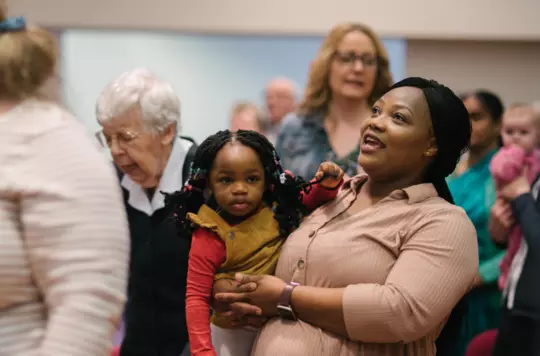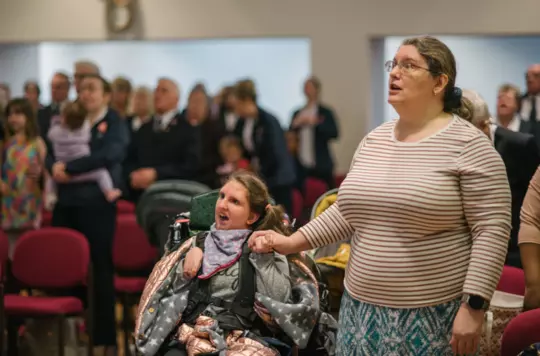15 May 2024
Happy Families resource: All part of God's family
George Tanton

George Tanton explores how the Happy Families resource sheds light on what family means today.
Since the end of last century, there has been a gradual change in how the nuclear family is perceived in our society. This shift has also been reflected in attitudes within churchgoing circles, including in The Salvation Army. Happy Families, launched at Together 2023, is a discussion card resource that helps foster intergenerational understanding around modern family dynamics.
Major David Betteridge, director of the Family Ministries Department, says: ‘We wanted to explain how families today look very different from how they used to, and how they vary considerably.’
Loosely based on the classic Victorian game of the same name, Happy Families is firmly rooted in the concept of intergenerational ministry – nurturing Christ-centred community by intentionally engaging two or more generations to be mutually invested in serving, sharing, worshipping and learning.
Outreach Mission Partner Rachel Gotobed (Family Ministries) highlights how intergenerational ministry brings people together: ‘It enables people to be intentional in getting to know one another, live together and worship together. In understanding each other better, it also breaks down preconceived and unconscious biases.’
Liz Hall, deputy director of Family Ministries, explains that Happy Families developed out of pastoral care, and a desire to counter such biases around complex and varied family situations. These could include same-sex couples, unmarried parents, one-parent households, mixed-race families or adopted siblings or disabilities.
Challenging traditional ideas around what a modern family unit looks like is a crucial element of Happy Families.
‘We think this is a very important conversation,’ Liz affirms. ‘While the Army has international and territorial positional statements around different aspects of inclusion, sometimes when different people walk into our halls, it can challenge the status quo of what people think a family is.’
David also asserts that the resource helps people recognise that all families are equal: ‘Just because a family is different, does not make them less valid than others. It’s about caring for them, and you care for them by valuing them and giving them dignity.’
Deborah Stanbury-Juster, assistant director of Family Ministries, considers how traditional concepts of the nuclear family, especially of the post-war generation and later, can be misleading. Compared to today, the public and private life of a family were kept separate.
‘There were gay relationships in those times or grandparents raising a grandchild as their own, but these things were hidden or ignored. Often these things were not spoken about,’ she says. ‘The face of a family in past years wasn’t always the honest truth, whereas now people are more truthful about family and what it looks like.’
Included in the Happy Families deck are ‘family life’ cards, which relate to specific family situations or life events – for example, divorce, domestic abuse, pregnancy or bereavement. These cards promote discussion of how congregations can support families going through these.
The cards are also designed to purposefully challenge preconceptions, such as those around a parent struggling with addiction or a parent who is in prison.
David explains: ‘They ask questions like “How do we feel about a family who comes to church whose son is struggling with addiction?” Even with the best will in the world, people are people, and they might look at a family like that and think there must be something wrong with the way the kids were brought up.’
‘A lot of hurt is hidden from people, because these families feel unaccepted,’ he asserts.
Happy Families is not designed with any particular focus or demographic in mind, but instead incorporates everyone.
‘Whatever our family looks like, whoever we are as individuals, we are all parts of God’s creation and we all have equal value,’ says David. ‘Ultimately, when all the cards go back in the box, it signifies that we all belong to the family of God.’
- For more information or to order Happy Families, visit the Happy Families resource page or email familyministries@salvationarmy.org.uk.
Written by

George Tanton
Editorial Assistant, Salvationist
Discover more

Support, training and resources to inspire families and individuals to flourish and develop in their faith journey.

Ensuring equality, diversity and inclusion are at the heart of everything we do.

